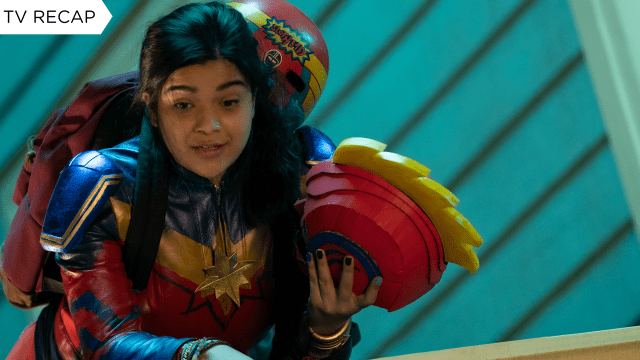Ms. Marvel is here! The beloved fan favourite of millions has made her MCU debut to the excitement of fans everywhere. But how does the premiere stack up in presenting one of Marvel Comics’ brightest young heroes to a mass audience on this scale?

Ms. Marvel introduces us quickly to the life Kamala Khan (Iman Vellani), a normal Pakistani-American Muslim teenager in the world of the MCU, balancing grades, family and friend life, and her intense fandom over the Avengers–all leading to her lack of focus on life right in front of her. We see a vivid, constantly daydreaming mind who loves to get lost in the world of superheroes. From the get-go, Vellani is delightfully awkward, charming, and constantly commands the screen as Kamala in the first episode of the series, “Generation Why”, easily translating her own very real fandom to the screen.
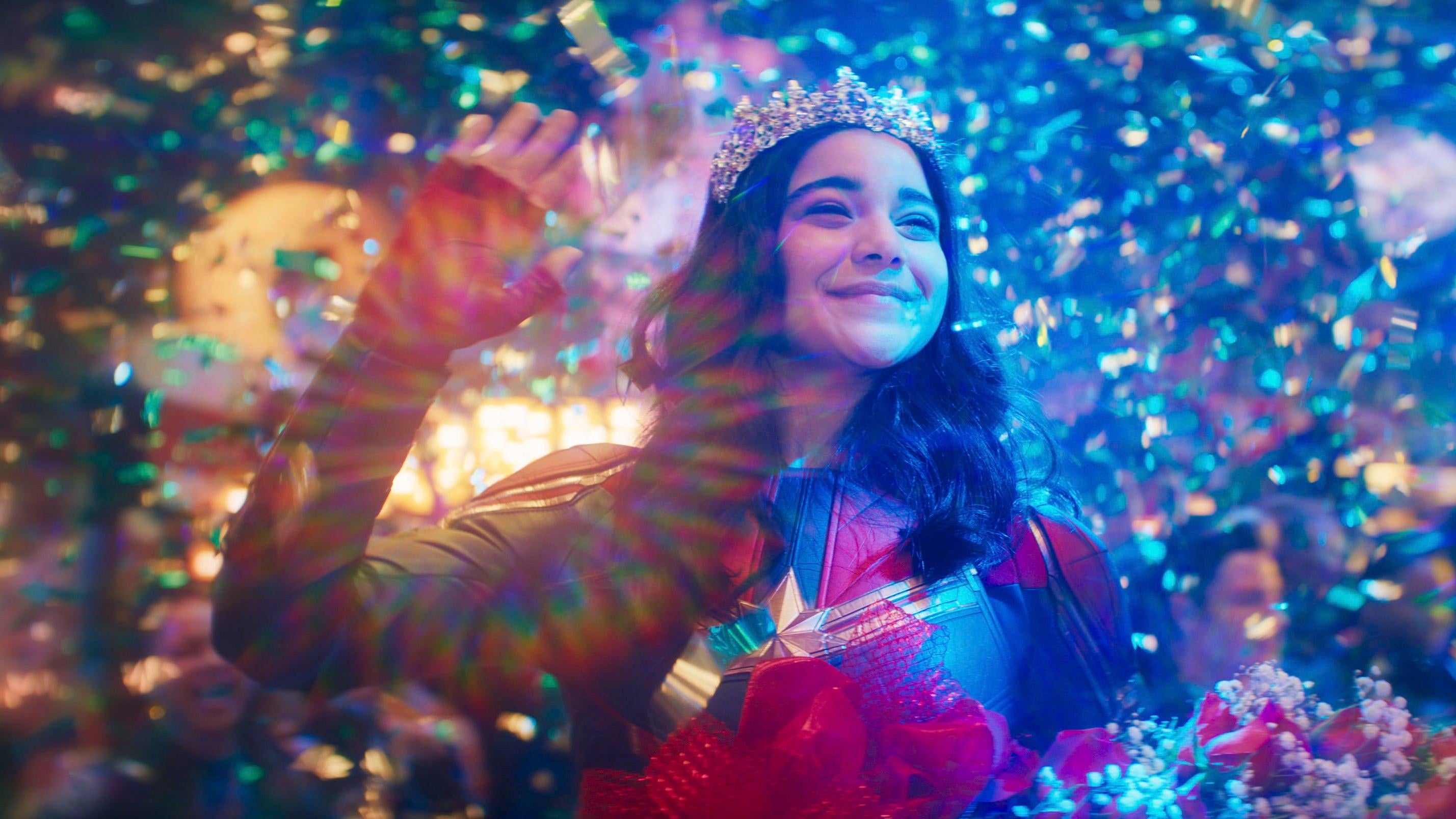
We experience her story keenly through her eyes, showcasing her colourful and incredibly detailed drawings and texts come to life in the background, making for a vivid teenage perspective. In that there’s a universal relatability that Vellani plays very well with her own particular charms, constantly brightening up our screens as we root for her. As we open the episode, we learn that she is an apparently very awkward kid at her school (which includes a nice blink and you miss it nod to the creators of Ms. Marvel). We see a social outcast who constantly daydreams and can’t keep her head in the present. There are Belle-esque vibes of wanting “much more than this [Jersey City] life,” i.e. something “cosmic,” as Kamala keeps saying about things she finds cool — mostly Captain Marvel. She simply wants adventure in the great wide somewhere, presumably with the Avengers! OK I’ll stop, but you get the gist. Will she learn that all she needs is where she is, as her friends, family, and schoolteachers keep reminding her between fantasy sequences of her superheroic dreams?
Just as quickly, we learn that Kamala has a goal supercedeing all those wants from her family and peers. An unabashed fan of Captain Marvel and her confidence, and wanting to emulate that however she can, Kamala extols to her best friend Bruno (Matt Lintz) that she’s eager to win the Captain Marvel cosplay contest at the upcoming “Avengercon,” the first officially-sanctioned fan event for the Earth’s Mightiest. Problem is, her parents refuse to allow her to go, prompting her to make an elaborate plan to sneak out of the house. In these scenes of conflict between Kamala and her parents throughout the episode, we explore how Kamala’s journey about how she’s able to reconcile what she wants, with what her parents (Zenobia Shroff and Mohan Kapur) want for her. Shroff and Kapur give great performances throughout the show, but a fine tuning on their presentation — some of their dialogue and accent choices come across as more culturally from more Indian Punjabi than Pakistani, specifically — may have been needed here to allow Pakistani audiences to feel better represented as the show progresses. On the Muslim aspect of Kamala’s family life however, the episode really shines. Her brother Aamir (Saagar Shaikh), a source of support and occasionally frustration for the young girl as the seemingly “perfect sibling” in their parent’s eyes, particularly has some great moments in here as we see him connect to his faith, such as when conveying to Kamala the importance of saying “bismillah.” It’s the small moments of simple, natural inclusion of the culture like that which can portray Muslims in a nicely casual light that non-Muslim audiences can learn and appreciate from. In that, the episode is a refreshing success for the MCU and beyond.
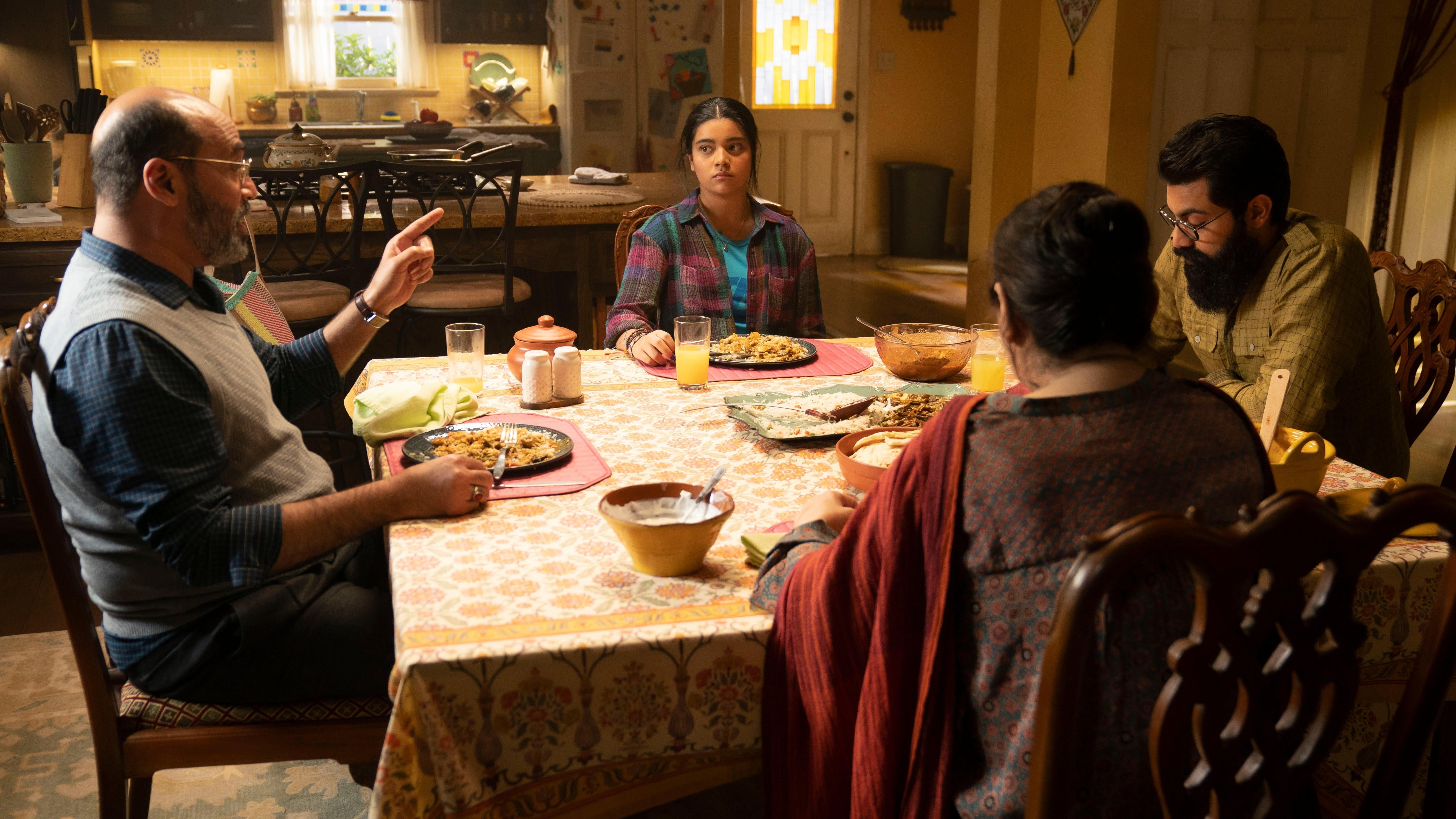
As Kamala is dragged out to do errands for Aamir’s upcomg wedding, we also learn that Kamala’s parents, especially her strict mother Muneeba, want to protect her from the influences and dangers outside their tight-knit community among Jersey City’s immigrant families. “I’ve seen what happens to people when they get obsessed with their fantasies,” Muneeba warns her daught. The children of many SWANASA (Southwest Asian, North African, and South Asian) immigrant families may be able to relate to this, as we incorporate cultural attitudes and stances that differ from our parents. While I understand what the show is going for here, and Vellani does particularly well in the scenes that convey her internal conflict with her family. But without more context of the specific cultural differences and prejudices they face that this episode largely brushes past, it just doesn’t land as hard as it could. The reasons for Kamala being an outcast sometimes come across as very broad in the writing. In her comics, a key part of her perceived awkwardness derives from others’ (namely white and non-Muslim people) perception of her identity. The ostracization is through the Islamophobia and racism she, like many others of us of SWANASA and Muslim origin, must unfortunately face in Western countries.
It was that relatability of having to face the racism and Islamophobia from her peers that was a key part of how Kamala Khan became one of the most sympathetic and, ultimately, universally relatable characters of the new superhero generation in her comics debut. For example, there’s a moment in her 2014 debut in Ms. Marvel #1 where Zoe Zimmer (played in the show by Laurel Marsden) makes an ignorantly Islamophobic comment to Nakia regarding her hijab about “honour killings” (which, while a very real and horrific topic, ultimately come down to a country’s culture and violent patriarchy rather than anything actually Islamic) to Kamala’s friend Nakia (Yasmeen Fletcher) when questioning her about her hijab. Zoe thankfully learns much better as the comics progress, but it’s through this type of reconciling interpersonal journey in Kamala’s comic origins that all audiences are able to better relate to these Muslim characters and their friends, identify and undo prejudices, and find something poignantly universal for them all to relate to.
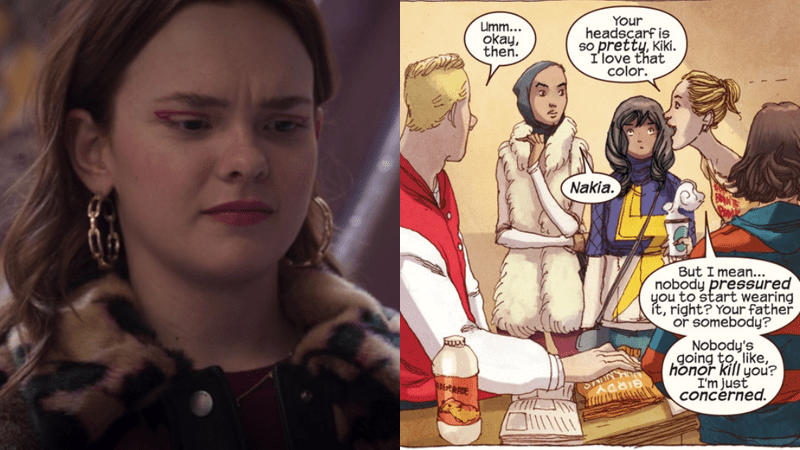
In Ms. Marvel the show however, Zoe just has a slight scoff at Kamala’s necklace spelling her name in Arabic. It’s barely a remark–she doesn’t vocalize any prejudicial jokes or comments that Muslims and SWANASA people so often face. Which might initially seem like a good thing! But it ultimately whitewashes the reality that so many Muslim kids and adults still have to face from their non-Muslim peers. Knowing that its source material had this much more searingly honest look, it’s rather a letdown for meaningful commentary. The impact of Kamala and Nakia enduring Islamophobia that so many Muslims worldwide have to face in the real world may unfortunately be diluted in the show, to more broadly speak to non-Muslim audiences. It seems, for now at least, that Marvel Studios didn’t want to address this very real topic in depth as the comics did. Perhaps they’ll be braver enough to do so later in the series, and we’ll see a more substantive look and active dismantling of Islamophobia the comics material already engaged with.
Eventually in the episode, it becomes more evident that Kamala’s current conflict is internal with her family and community, such as when she voices support for another young woman who decided to travel Europe to “find herself” and gets dismissive looks from her mother and a family friend gossiping about it. We get the sense that Kamala fears that she will not be able to find out who she truly is and what she wants from her community, which is another interesting divergence from the comics. There, it’s not to say that Kamala’s parents weren’t presented as relatively conservative, or that her mother Muneeba doesn’t disapprove of her fandom life, but there wasn’t necessarily this level of emphasis on that that the show is giving us. It was refreshingly more subtle and combined with the prejudicial struggles that Kamala faces from her broader society as well specifically because of her Pakistani and Muslim heritage. As some Muslim critics have suggested in early reactions to the series, there’s space for more nuance when it comes to these topics, and not make Kamala’s story here seem like it’s about a struggle to “be free.” This is the first episode after all, and Ms. Marvel may very well become more nuanced as it goes along! More subtlety may have just been a better approach as the show started out, though.
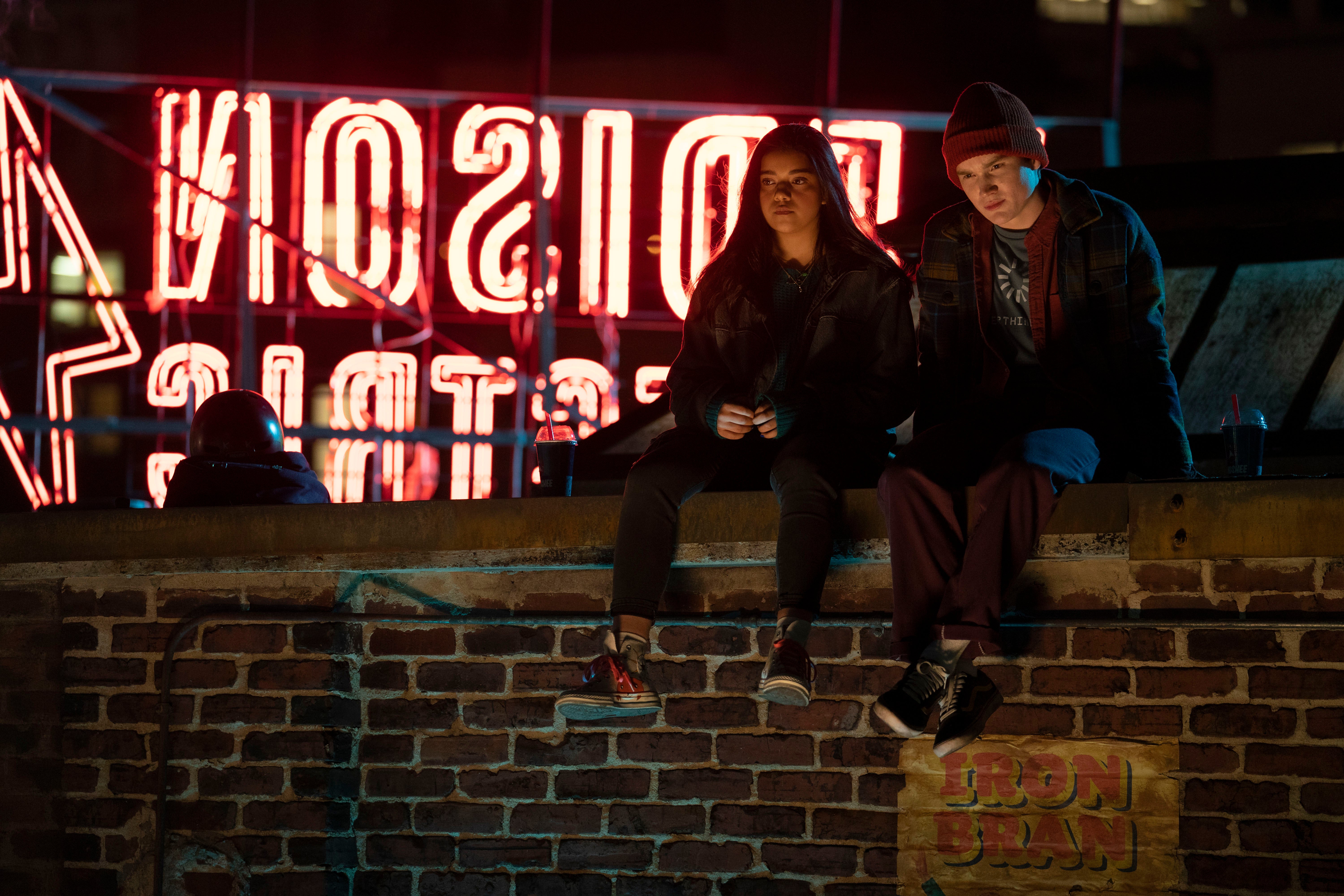
But back to the main story. As they round out ideas for Kamala’s Captain Marvel costume, Bruno suggests to include “something Pakistani” to honour her parents (even though she disobeys them later in the episode by sneaking out of the house to Avengercon). That something it turns out, is a bangle sent to her from her grandmother in Pakistan, an item we see Muneeba express wariness over when it arrives in the mail earlier in the episode. The moment between Bruno and Kamala that inspires her to put on the bangle is a sweet character beat between the two. But on the other hand, the bangle’s repeated appearances in this episode being accompanied by snippets of with South Asian-inspired music (Ms. Marvel’s original score is composed by Laura Karpman, a white musician) unfortunately gives a slightly Orientalist vibe with a potential “powers are activated by a ‘foreign magical object’” trope–especially given this is seemingly a distinct separation from Kamala’s origins in the comics.
With the knowledge that the creators have said her powers more directly tie back to Kamala’s family lineage (is she somehow still an Inhuman, as she was in the comics?), I’m more hopeful that won’t be the case, however. Even with her powers being very different from her regular polymorphic abilities in the comics from what we’ve seen so far, hopefully there will still be a resonant journey she takes with them that matches her arc in the comics. With the emphasis from Muneeba on wanting her to be more grounded while her powers start off as cosmically, could we somehow in the end see Kamala internalizing that lesson, embracing her own body’s abilities rather than the sparkly light constructs, and thus somehow become the polymorph she always was? We’ll have to see how this plays out as the show continues.
After acquiring the bangle and the rest of her costume, and despite the logistical hurdles (including Kamala losing her bike) along the way, she and Bruno make it to Avengercon. The convention, in turns out, takes place at Camp Lehigh, the American military facility seen in Captain America: The First Avenger and The Winter Soldier, and more recently Avengers: Endgame and What If? Given the ongoing discussion about Marvel Studios relationship with the U.S. Military and the military’s larger role in financing moviemaking at large, it’s a choice for the first Muslim MCU superhero to be attending an Avengers convention on what is still seemingly an active military base! Despite a quick scene having Kamala try on a prop military helmet (seriously, why), it’s thankfully not too propagandistic as other MCU properties have been, but still, why not the Javits Convention Centre instead? Avengercon looks fun enough, like a cross between a comic con and an amusement park, just all Marvel themed.
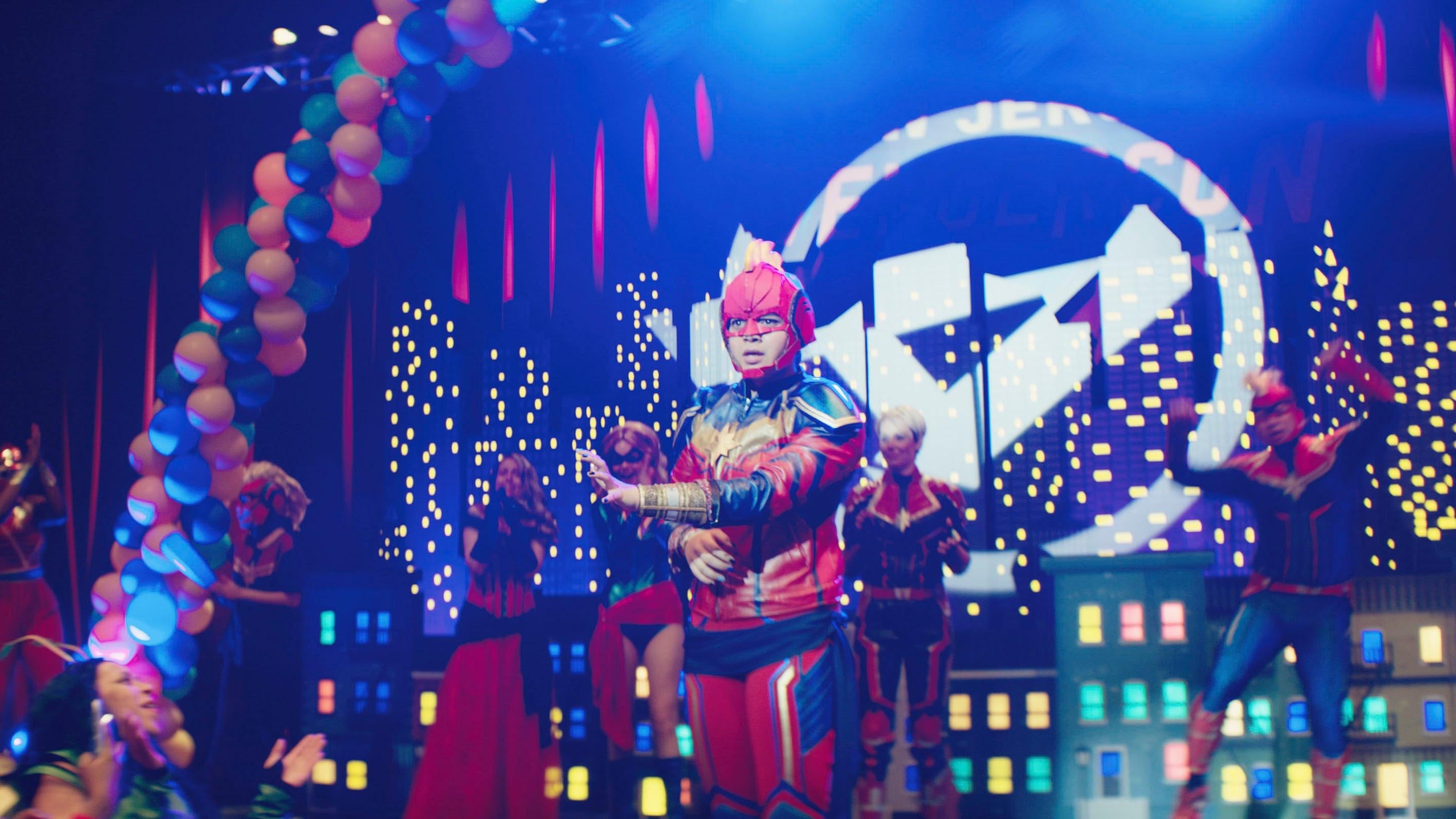
Shortly after, the episode climaxes when Kamala puts the bangle on for her final costume touch just before the cosplay competition begins — there’s a sort of force field that surrounds her body, and she briefly enters a purple realm where she sees many shadowed figures with white eyes around her. Are these her family? Aliens? Maybe Inhumans? We’re left to imagine as she gets out on stage, suited and masked up to conceal her identity — but with the stress and intense lights from the cameras on her, her powers activate, causing mayhem when she accidentally decapitates a nearby giant Ant-Man figure. Things get hectic, and in a nice mirror to the earlier moment, Kamala gets to save Zoe (also participating in the Ms. Marvel cosplay contest with an outfit that resembles Carol’s original Ms. Marvel costume from the comics with the current Captain Marvel colours) from some falling debris–literally a giant Mjolnir replica–immediately cementing her status as a hero, unfamiliar powers or otherwise.
The thrills are cut short when Kamala comes back home and sneaks into her room, only to find her mother waiting for her, severely disappointed in her daughter’s rebellion. Shroff gives a particularly impassioned performance here, showcasing the mother-daughter tension that is seemingly going to be a big focus as Ms. Marvel presses forward. This clearly stresses Kamala, but the episode ends with her looking at her Captain Marvel poster and observing her new energy powers and smiling as she says “cosmic.” Her daydreams have become a reality to escape from her current one. Will she continue to want that?
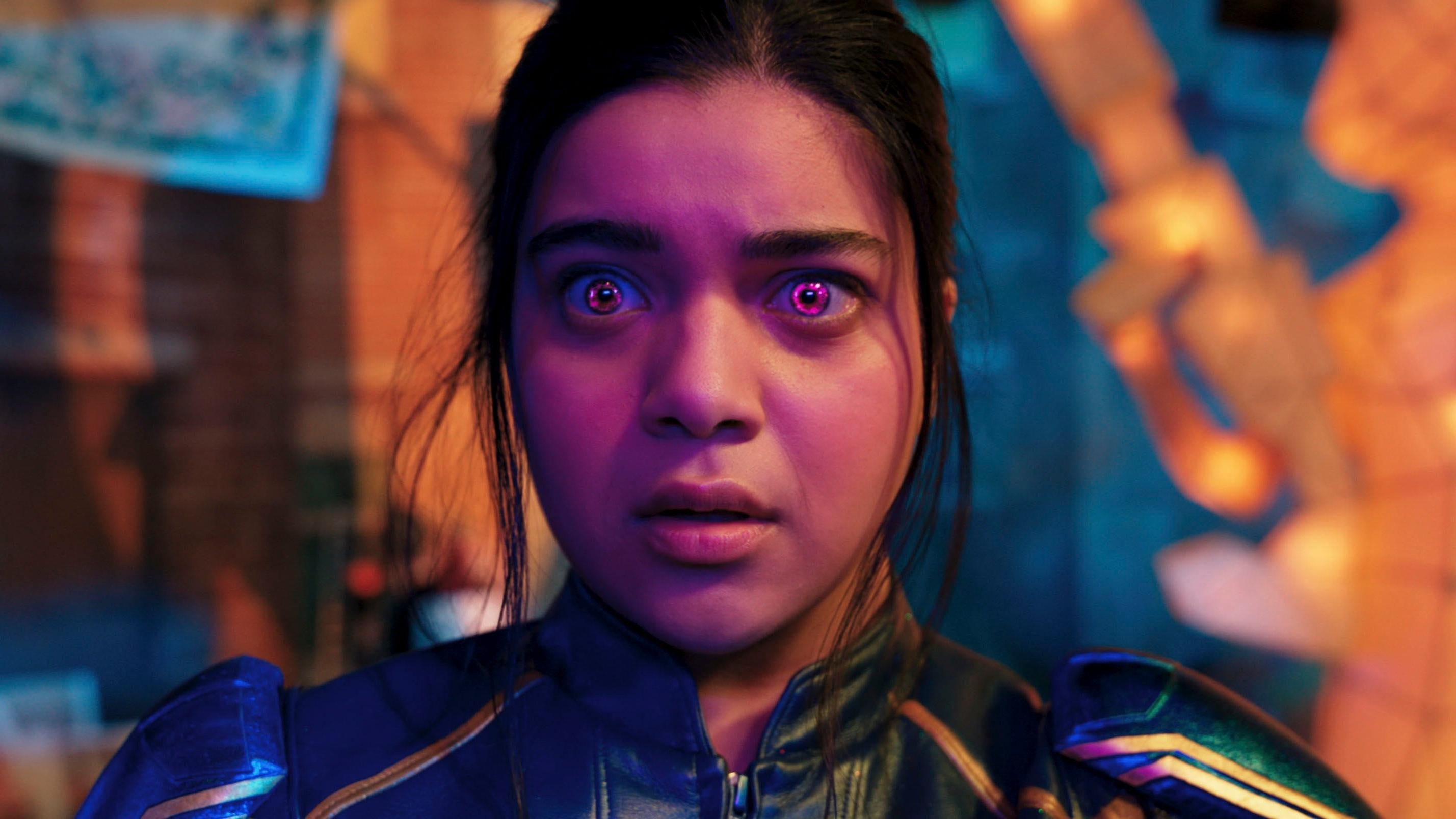
We’re once again left to wonder, but the episode is not over: in its post credits scene, we see mysterious government agents (Alysia Reiner and Arian Moayed, returning from Spider Man: No Way Home as Agent P. Clearly) going over footage recorded by Zoe of the Avengercon accident, showcasing Kamala’s powers–and they’re now looking to get a hold of the MCU’s newest hero. Who are these agents? Will Kamala make her family happy, or will she travel to Europe? Will Zoe take an Arabic class? Time will tell, but in the meantime, the first episode of the MCU’s Ms. Marvel is a good and fun start to Kamala Khan’s journey of self-discovery. Vellani’s spectacular performance and Kamala’s moments with her family will make audiences, and especially many of us who are SWANASA and Muslim, feel delighted.
Hopefully, however, the show is able to incorporate much more of the searingly relevant and realistic tone of its source material to become something more deeply resonant. With the exploration of more specific experiences our communities still face, it may become truly great. Just like Kamala Khan.
Want more Gizmodo news? Check out when to expect the latest Marvel and Star Wars releases, what’s next for the DC Universe on film and TV, and everything you need to know about House of the Dragon and Lord of the Rings: The Rings of Power.
